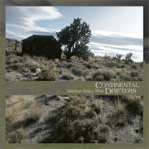| R
E V I E W S
N I N E T E E N N I N E T Y-T H R E E
|
|
NO DEPRESSION Nineteen Ninety-Three
should have been the Continental Drifters' first album. However, by
the time they finished it, the Drifters had relocated from Los Angeles
to New Orleans and, more significantly, had lost two of their three
original singer-songwriters. So they shelved these sessions, and their
1994 self-titled disc wound up as their official debut. - Michael Berrick OFFBEAT
- www.offbeat.com DRIFTING BACK TO THE '90s I confess I didn't get the Continental Drifters at first. I'd see them and enjoy the show for a while, but at some point it would feel unfocused to me. Who was the central voice? Was this Peter Holsapple's band with songs by Vicki Peterson, Susan Cowsill or Carlo Nuccio thrown in, or was Vicki the focus, or Susan or Carlo? After a few shows, I finally realized the obvious; the central voice was the group's voice, and that for the Continental Drifters, the group was the thing. In a show business culture that focuses on the marketable face and identity, that's a tough idea to grasp and a tougher idea to sell. Chronologically, Nineteen
Ninety-Three is the first Continental Drifters album, and it documents
a time when things were very different but very much the same. Recorded
in 1993 as the title indicates, the band was based in Los Angeles and
the line-up was very different. Nuccio, Ray Ganucheau and Gary Eaton were
the primary songwriters and vocalists, and Holsapple was the keyboard
player and backing vocalist. "Invisible Boyfriend," his only
song on the album, is sung by Eaton. At the time, Peterson and Cowsill
were the Psycho Sisters and were regular guests for their weekly shows
at Raji's, not "official" members. They sing backing vocals
on two songs, and Robert Maché, who along with Robert Lloyd guested
as the Bob Squad in Los Angeles, isn't on the disc at all. Not surprisingly, the songwriting is as strong here as on any of the records. Ganucheau and Nuccio's "The Mississippi" is perhaps the band's first great song and has been one of the highlights of the live show for the last few years, albeit with Cowsill singing. With the release of the new disc, it's available on CD for the first time and this version shows that the strength is first and foremost in the song. This recording doesn't recall Bobbie Gentry like the song did when Cowsill sang it, but it's still soulful with Ganucheau singing, and Nuccio's drumming provides the blueprint for the loose, lumpy-wheel groove Russ Broussard later perfected. After "The Mississippi," the most comment-worthy thing about Nineteen Ninety-Three is how coherent it sounds. You can hear differences in the songwriting-Eaton's "Mr. Everything" and "Match Made in Heaven" owing a debt to Ray Davies, Nuccio's "Side Steppin' the Fire" recalling The Band, Ganucheau's "No One Cares" and "I Didn't Want to Lie" owing more to blues and soul. Those are merely influences though, and filtered through these writers and these musicians, they're adapted to the group's sound, which is pretty much like the Drifters you probably already know. The guitars buzz here a little more, but chalk that up to Ganucheau and Eaton, both of whom had left before the recording of Continental Drifters. This review, incidentally, is not an epitaph for the Continental Drifters. The word is that Peterson, Holsapple, Mark Walton and Robert Maché want to continue, and seeing as how the band has been through as many changes as it has so far, there's no reason to think another incarnation won't form. In fact, the "first" Continental Drifters album was recorded in just such a period of line-up upheaval when Eaton decided he had too many roots in Los Angeles to move to New Orleans, and for health reasons, Ganucheau bowed out. It no longer made sense to release a CD with two of the three singers not with the band, which explains why this album was shelved for so long. At that point, Maché was living in Tucson so when the new line-up was recording Continental Drifters, they had to courier the tapes to him so he could put his guitar parts on. It would be nice to think Nineteen Ninety-Three will garner the Continental Drifters the kind of audience and appreciation they deserve in New Orleans, but the odds are against it. Since they're not playing live right now, it'll be tough to interest people in "new" material, but beyond that, New Orleans has a bad habit of treating musicians who were successful before they moved to town as carpetbaggers. In this case unfortunately, the "outsider" stigma has obscured the common thread between the Continental Drifters and New Orleans bands, and it's ironic that a city has a hard time finding a place for a band that embraces the same communal principles as its best musical products-jazz and funk. - Alex Rawls |
© 2003 Continental
Drifters ®™

